Dixieland Crackerjacks, history of the band
1994 - foundation of the band
1995 - first recordings
1996 - becoming a 'Pro' band
1997 - first official TV appearance
1998 - Belgium, France and Tax inspectors.
1999 - England
2000 - www.dixielandcrackerjacks.com
2001 - St. James in Germany
2002 - economical crisis
2003 - more festivals in the Netherlands
2004 - even more festivals
2005 - lots of TV, Slagharen and the Caribbean Suite
1994 - foundation of the band
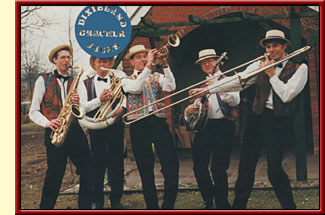 On
January 15, 1994 the first official* performance of the Dixieland Crackerjacks
took place. A line-up of five pieces consisting of Cas Straatman - piano,
Ancel Klooster - drums, Tim Nobel - double bass, Michael Muller - trumpet
en Bert Brandsma - sax, clarinet, took part in the annual Swing contest
of the Jazz festival in Leiden, the Netherlands. Without any prior rehearsals
and using some hastily thrown together arrangements the band left all
competition at a distance and won first prize. Michael Muller also was
singled out for best soloist.
On
January 15, 1994 the first official* performance of the Dixieland Crackerjacks
took place. A line-up of five pieces consisting of Cas Straatman - piano,
Ancel Klooster - drums, Tim Nobel - double bass, Michael Muller - trumpet
en Bert Brandsma - sax, clarinet, took part in the annual Swing contest
of the Jazz festival in Leiden, the Netherlands. Without any prior rehearsals
and using some hastily thrown together arrangements the band left all
competition at a distance and won first prize. Michael Muller also was
singled out for best soloist.
(*In 1993 in Amsterdam another performance took place under the name Dixieland Crackerjacks. Michael Muller and Bert Brandsma were involved in what really was a gig of the Willie Ashman Original Jazzband. For contractual reasons that band in this occasion could not play under its own name. Bert Brandsma suggested the name Dixieland Crackerjacks and leader of the Willies, Guido Laffree, borrowed the name for one day)
Of course this was the best start one could dream for. After this performance and the publicity it gained one by one follow up bookings came in. The first request for a marching band also came in soon. Since it is quite impossible to parade with a double bass or piano this meant it would be necessary to perform with a slightly different personal. People whom from the start often played during parade gigs were Hein Overbeek - banjo and Piet Schrijver - washboard. (Not the same person with this name who once was goalkeeper in the Dutch football team)
First booking at a Jazz festival was an invitation to perform at the
annual festival in Den Helder. (Holland's Marine harbour) The band made
such an impression that it was rebooked every single year afterwards,
even till today.
The first international performance took place in Gelsenkirchen, Germany.
During this year American sousaphone player Kevin Gallagher became a regular
member. In Germany on most occasions the band was asked to perform with
6 musicians. In that case trombone player Jeroen Roll completed the line-up.
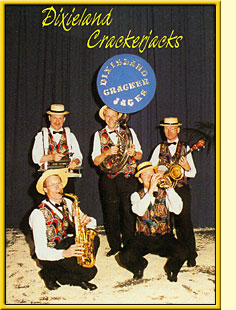 What
is a band without a CD? Gramophones were considered old fashioned already
and tapes one used to copy music to. Potential bookers would like to hear
some musical samples first and an always growing number of fans liked to
hear their favourite band at home. With this in mind it was decided to record
the band in Groningen at February 13 and 14. Musicians involved were: Michel
- tp, Bert - sax, Kevin - sous, tp, Hein - bjo, Piet - wb, Tim, bs, Han
Hesselink - piano en René van Astenrode - drums. That's how the first
CD was born called: "Red Roses For A Blue Lady". Title song was
sang by the new piano player Han Hesselink, responsible for a lot of success
in the early days of the band.
What
is a band without a CD? Gramophones were considered old fashioned already
and tapes one used to copy music to. Potential bookers would like to hear
some musical samples first and an always growing number of fans liked to
hear their favourite band at home. With this in mind it was decided to record
the band in Groningen at February 13 and 14. Musicians involved were: Michel
- tp, Bert - sax, Kevin - sous, tp, Hein - bjo, Piet - wb, Tim, bs, Han
Hesselink - piano en René van Astenrode - drums. That's how the first
CD was born called: "Red Roses For A Blue Lady". Title song was
sang by the new piano player Han Hesselink, responsible for a lot of success
in the early days of the band.
This years next highlight was a tour to the Isle of Borkum in the northern part of Germany. The CD had just been released and sold like hot soup in winter. During these days the members befriended musicians of another band: "Lutzemann's Jatzkapelle". A friendship that would turn out to last for many years.
Meanwhile the band was asked more and more not only to perform during weekends, but also on weekdays. This caused troubles with Hein, who was supposed to appear at his day job. A nice solution was found in a deal in which it was agreed that Hein did the weekend gigs and banjo player and singer Koos Greven, who also became a very important member in time, would play the other days.
During summer, the Dixieland Days in Kijkduin and the Möhnesee Jazz festival were considered highlights. To both places the band would return in later years.
A new important booker contacted the band in October: a chain of holiday resorts with the name "Centerparcs" wanted the services of the band for it's entertainment department. This meant a long series of performances, especially in the southern part of the Netherlands.
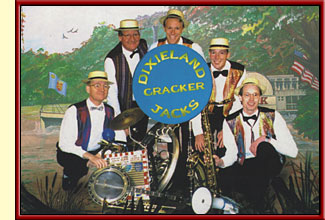 In
the first years of it's existence the band had been a kind of semi/amateur
organisation but with the large number of performances at Centerparcs this
had to be changed. Kevin, Michel and Bert started a musical joint/venture.
Shortly afterwards Koos en Piet started musical businesses of their own.
In
the first years of it's existence the band had been a kind of semi/amateur
organisation but with the large number of performances at Centerparcs this
had to be changed. Kevin, Michel and Bert started a musical joint/venture.
Shortly afterwards Koos en Piet started musical businesses of their own.
Nice events during this year were the Jazz festivals in Enkhuizen, Doetinchem, Bergum, Kijkduin (4 performances) Den Helder (3 performances) and Delft.
Koos Greven started a fruitful promotional campaign in the Northern parts
of Holland, especially in Heerenveen. Thanks to his activities the band
played in numerous events like Ice speed skating World and European championships
and Theatre concerts in `Het Posthuis`. In Piet Schrijver's Café
't Kurkje the band became a regular attraction, a situation that would
last till the year 2004.
One day at ´t Kurkje during a banjo feature version of Duke Ellington's
the Mooche a fight in the audience occurred. Till today we are speculating
if it was Hein Overbeek`s interpretation of the piece or what else could
have caused this fight.
The band at this time welcomed a new musical talent on double bass. Studying at the conservatory in Zwolle, young, beautiful and she happened to be a woman. Especially the last was kind of a shock for some very conservative people in the Traditional Jazz World, but happily Marieke Ladrak was strong enough to fight these kind of sad figures.
The official address of the band from the start till the year 2000 always had been in Tolbert, a little village in the province of Groningen. During Christmas 1996 the band for once played in it's Hometown.
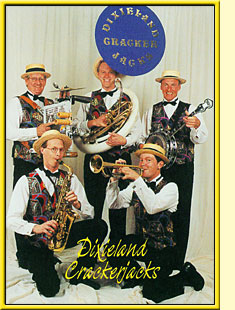
During spring the Crackerjacks went to Germany for a short tour, organised by Lutz Eikelmann, forever a friend of the band. The band played at Jazzclubs in Mühlheim, Cologne and Möhnesee. In Mühlheim the response of the audience was so enthusiastic that the band was invited to come back during the Jazz festival at a later time in the year.
June 23 a new chapter started, the first official TV appearance. In Aalsmeer at the then renowned Studios at the van Cleefkade 9 the band recorded "When You're Smiling", with vocals by Koos Greven. Bert, Kevin, Michel and Piet were the other members present that day. It was broadcasted by the Veronica Channel.
Also during this year another CD production was released on which the
band could be heard. A band called `Dieptriest`, translated the name would
mean something like `Very Sad`, wanted to make a recording with a Dixieland
feeling. Song title was "Waar is Suzanne?". Responsible for
the jazz elements were the same musicians as at the TV recording, augmented
with trombone player Arend Huisman. Arend would during time becoming a
more important member of the band, the more at the time he started to
double on Sousaphone and on occasion even on trumpet*.
"Waar is Suzanne?" was regularly broadcasted on a local Radio
and TV station called TV noord.
*One recorded example of Arend´s trumpet playing survives in
the version of `South`, recorded in the year 2000. At the last 20 bars
or so, he changes from trombone to trumpet to play the second part in
the stunning 3 trumpet final chorus with Michel Muller playing lead and
Sytze van Duin on third trumpet.
A number of regular clients kept calling for the band. The Crackerjacks
stayed in demand at Centerparcs, the band played very often in Breda and
also four days at a row in Bakkeveen, at the business of Riemer van de
Velde, a famous person in the province of Friesland, mainly through his
activities as chairman of the soccer team of FC Heerenveen.
New year's Eve the band performed for the second year in a row at Hotel
Tjaarda in Oranjewoud.
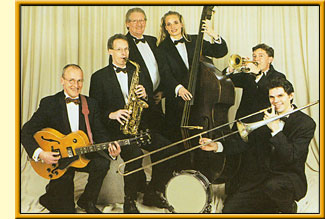 A
year with a lot of international travelling and many Jazz concerts, Jazzclub
Drachten, festival Laag-Soeren, Jazzclub Tiel, Jazzclub Hürth, festival
Gronau, festival Hillegersberg, festival Osterode, festival Mühlheim,
festival Medemblik, festival Vreden, festival Kiel.
A
year with a lot of international travelling and many Jazz concerts, Jazzclub
Drachten, festival Laag-Soeren, Jazzclub Tiel, Jazzclub Hürth, festival
Gronau, festival Hillegersberg, festival Osterode, festival Mühlheim,
festival Medemblik, festival Vreden, festival Kiel.
Five trumpeters in Belgium.
An interesting request came in from Belgium. The band had a good reputation
for the work of the trumpets. It was a known fact that the band had with
Michel and Kevin some of the finest trumpet players among it's members.
So a booking agent got the fine Idea to ask the band to perform with FIVE!
trumpets at a historical Castle at Brasschaat, near Antwerp in Belgium.
With the assistance of former Dutch Swing College trumpeter Sytze van
Duin and Bart Tuinman of the New Orleans Syncopaters already 4 parts were
covered for. Bert Brandsma decided to practise a lot on one of Michel's
spare trumpets during 2 months and was then able to fill out the fifth
trumpet chair.
This meant many hours in the car, only five minutes of playing and back
home again. As Kevin Gallagher used to say: "I've done many gigs
in my life… and this was definitely one of them!".
Tour de France
With as many as 7 musician's the band went on tour through France. Kevin,
Michel, Marieke, Arend, Piet, Koos and Bert were the players.
The band stayed in a very interesting place, a historical Castle who's
only regular inhabitants happened to be women! Some of the boys in the
band thought they had landed in heaven after all. It turned out that the
Castle was formerly owned by some Guru, who fled to Switzerland when he
discovered that the French Tax officers were on his trail, leaving his
women stranded. These people tried to survive by renting rooms like some
kind of hotel.
The last concert in France a nice surprise appeared. Koos Zwagerman, a
very youthful and talented trumpeter from Den Helder had convinced his
parents to visit this Crackerjacks performance and of course also played
a couple of tunes as guest soloist.
A lesser surprise was a visit from the Dutch taxes, one day after the band returned from a killing three and a half weeks lasting tour abroad. The Tax inspector thought to win easy money from the band, but happily during a court case all claims for money were overruled.
A much nicer event was another visit to Belgium, this time on invitation of Centerparcs in Peer.
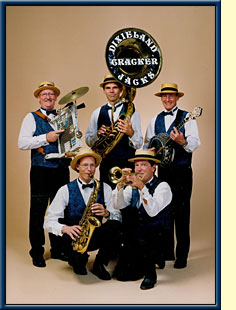 During
January, Marieke Ladrak did her final exams at the conservatory in Zwolle.
With the most authentic sounding instruments, like washboard, banjo and
singing with the help of a megaphone the band performed 'You're Nobody's
Sweetheart Now' in an overwhelming speed. The entire conservatory was impressed
and Marieke passed her Exam.
During
January, Marieke Ladrak did her final exams at the conservatory in Zwolle.
With the most authentic sounding instruments, like washboard, banjo and
singing with the help of a megaphone the band performed 'You're Nobody's
Sweetheart Now' in an overwhelming speed. The entire conservatory was impressed
and Marieke passed her Exam.
A new regular place to play was the Casino in Groningen. After a first appearance in April the band would return there many times.
Michel Muller married to his Sanny during this year and of course the band couldn't miss this event. During this evening the band met drummer Raymond van der Hooft whom in later years would become the band's regular drummer.
During July the band went abroad again. This year the band was invited to play six performances at the annual Birmingham Jazz Festival in England. Especially for Kevin and Michel a great happening. Kevin could for the first time in years speak his mother's tongue all day long and Michel returned to a city where he had been living for quite a while, meeting many old friends from these earlier days. Michel also turned out to be a specialist in driving at the left side of the street, as opposed to the right side, not the 'wrong' side, which large parts of Continental Europe use.
The summer months were totally filled out with performances as marching band. 'Midweekfeesten' in Steenwijk, Blauwvingerdagen in Zwolle, events in Dedemsvaart and Hoorn, Thursday Meppeldays, everywhere the band could be seen and heard. Many pairs of shoes could be thrown away after this summer.
Another nice international trip was a performance at the International Jazz Festival in Bremen. One of the first occasions that drummer Raymond van der Hooft would play with the band. During Christmas the band would play at Lauswold in Beetsterzwaag.
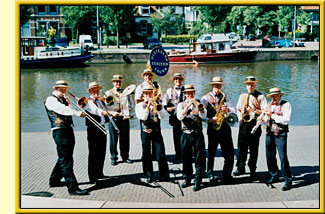 A
new century, a relatively new way of communication starts to gain more and
more importance. The Dixieland Crackerjacks try to keep up with the changing
times and a website is started with information about the band and it's
performances. Looking back, it's really stunning to see how fast these developments
took place. Only four years later, it looks as if the world couldn't go
on without the internet.
A
new century, a relatively new way of communication starts to gain more and
more importance. The Dixieland Crackerjacks try to keep up with the changing
times and a website is started with information about the band and it's
performances. Looking back, it's really stunning to see how fast these developments
took place. Only four years later, it looks as if the world couldn't go
on without the internet.
A new CD became a necessity. The first one, 'Red Roses for a Blue Lady'
had almost totally sold out and audiences kept asking for more recent
work. So in March of 2000 the band went to the famous studio's of Max
Bolleman. Max had recorded many famous jazz artists like Dizzy Gillespie,
Chet Baker and Wynton Marsalis, just to give a sample of only trumpeters.
With Michel Muller / tp, Sytze van Duin/tp, Arend Huisman/ tbn, Bert Brandsma/saxes,
cl, Koos Greven/bj, gt, voc, Marieke Ladrak/bass, Raymond van der Hooft/dr,
René van Astenrode/vibr. and Piet Schrijver/wb. the band recorded
'I'll See You In My Dreams'in every way a unique session. In absolutely
world record time everything was recorded, most tracks in just one take.
Later that year the CD was officially presented during a theatre concert at the Posthuis in Heerenveen. The first time, but happily not the last, that the band was presented on the main stage.
Kevin Gallagher in the mean got bored with the very irregular and in a way uncertain life as a travelling musician. This meant that the joint venture had to be ended, starting the first of April. Michel en Bert both started musical businesses of their own. Kevin found regular employment as a piano technician, a job in which, also thanks to his impeccable ear, he would reach great results. In short time he would become the most important piano tech in the big theatres of Groningen.
At a later time during that year the European Championships soccer were organized in Belgium and the Netherlands. The Dixieland Crackerjacks played at all the games of the Dutch national team in Rotterdam and the final match in de Kuip between Italy and France.
In August the band moved from Tolbert to another small Village in the
north of Holland, called Garijp.
This year the band played for the first time in the Jazz club of Groenlo.
In December they again played at the Jazz festival in Kiel, Germany and
during Christmas they returned to Beetsterzwaag.
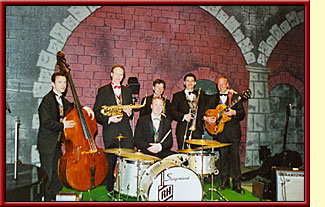 In
January the members of the band were invited as guest soloist for a couple
of New Year's concerts of Big Band Moonlight in Assen at theatre the Kolk,
an unforgettable moment. An organisation called Stichting Jazz in Groningen,
that normally specialised in modern and avant garde Jazz, for once asked
the Dixieland Crackerjacks to give a performance.
In
January the members of the band were invited as guest soloist for a couple
of New Year's concerts of Big Band Moonlight in Assen at theatre the Kolk,
an unforgettable moment. An organisation called Stichting Jazz in Groningen,
that normally specialised in modern and avant garde Jazz, for once asked
the Dixieland Crackerjacks to give a performance.
Again the band went outside of Holland by means of tours to Karlsruhe,
Dresden and Görlitz, located near the border of Poland.
Especially the six performances in Dresden can be counted among the absolute
highlights in the band's history. One date for an audience of 3000 people
in the "Kulturpalast" was also seen on TV. The day after the
band played an open air concert for 8000 people.
Then the members were sent with police escort to the other side of town,
where the closing parade started. As the boys in the band said to each
other in the bus: "They'll never believe this at home!"
Meanwhile, Marieke Ladrak had left the band. She had met the man of her dreams and followed him to New York. Later they moved to the Caribbean Island Aruba, where Marieke started teaching music and would become mother of two lovely kids. Her place in the band came into the fine hands of bass player Ruud Fley.
This year a new, enlarged version of the band was introduced: "The Dixieland Crackerjacks Supersize Orchestra". A year earlier this formula was asked to play for the Cycling competition: Tour of Holland. The musicians liked it so much that they decided to try to get more gigs for this Orchestra, which plays in the New Orleans Brass band tradition. The first supersize band members were: Michel Muller & Edith Stegeman - tp, Sytze van Duin & Jasper van Pelt - tbn, Bert Brandsma, Adolf Robertus and Bas Koningers - saxes, Koos Greven - banjo, Arend Huisman - sousaphone en Piet Schrijver - washboard
The success of the CD "I'll See You In My Dreams" made it possible
to record another one. So during a tour in Germany, with guests Lutz Eikelmann
and Franziska Mouse, the band recorded "St. James in Germany"
in Essen at the studio of Thomas Guthoff.
Lutz Eikelmann pushed the band to record it's first own composition: Nassau.
In wintertime the band had a large series of performances at the "Winterefteling", thanks to Bart Tuinman.
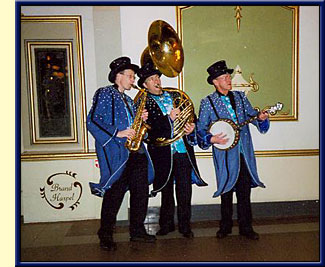 The
musical industry also felt the worldwide economical crisis that developed
in the two foregoing years. This meant that it was harder to find work and
many gigs were for small line-ups. New was a performance for the birth of
a child! A nice series of performances took place in Hoofddorp, during the
Floriade Festival, thanks to bass-saxophonist Alex de Leeuw.
The
musical industry also felt the worldwide economical crisis that developed
in the two foregoing years. This meant that it was harder to find work and
many gigs were for small line-ups. New was a performance for the birth of
a child! A nice series of performances took place in Hoofddorp, during the
Floriade Festival, thanks to bass-saxophonist Alex de Leeuw.
A new musical talent was discovered in the person of trombonist Selena Kuiper. Arend Huisman tried to play in as many as 18 bands at the same time and too often couldn't make it on Crackerjacks gigs. Selena was first choice to take over his position and gradually became a regular member. Selena first studied at the conservatory of Alkmaar, then played for two years in a theatre tour with comedienne Tineke Schouten and while entering the ranks of the crackerjacks studied in Rotterdam with Bart van Lier and Ilja Reingoud.
On double bass the Italian lover boy Marc Giordano took over from Ruud Vley, whose mayor interest was in modern jazz.
Despite the economical crises the Supersize Orchestra played at the Jazz festival in Kiel with eleven members. Here Edith Stegeman performed as trumpet playing Grand Marshall. Her Husband, trumpeter Jasper Gloerich and Alex de Leeuw on baritone sax also joined the band on the occasion.
A series of performances were given in a shopping centre in Hilversum, where the band was asked to fill out the entire annual entertainment program.
The Caribbean suite, a six part musical composition from band leader Bert Brandsma was premiered at the Posthuis Theatre in Heerenveen.
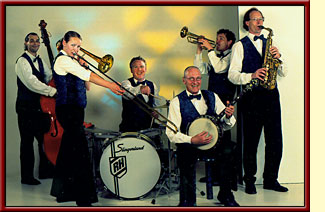 After
a second stint at the Efteling during winter, the band played for the first
time in the famous Haagse Jazzclub.
After
a second stint at the Efteling during winter, the band played for the first
time in the famous Haagse Jazzclub.
Ridiculous high Tax rates for non German musicians made it more difficult to find work in Germany, a strange situation if one takes in mind that the European Union should mean more open borders and freedom to work in the different countries.
The horn section of the Crackerjacks, Michel, Bert and Selena took part I a recording session in Essen, for The Twins, a skiffle group.
A historical evening takes place in Roden, on the 11th of april with
a program build around bandleader Bert Brandsma, with in order:
Saxophone Quartet Les Boreades, a battle of the saxes between Brandsma
and living saxophone legend Jenne Meinema. The evening was concluded by
a performance of the Dixieland Crackerjacks.
The Supersize Orchestra played in Leeuwarden, at the Jazz Festival of Hoofddorp and later during the year in Delfzijl, where Jenne Meinema again joined the band and played marvellously.
The band also was at the Jazz Festivals of: Attendorn, Soltau, Hillegersberg, Kijkduin, Domburg en IJsselstein. At the last location the audience went wild with Selena Kuiper in excellent shape.
The jazz clubs in Almelo and Groenlo also invited the band.
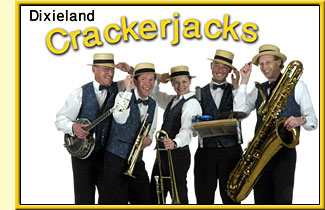 The
very first performance in this year took place on January 1. at the Jazz
Club in Assen.
The
very first performance in this year took place on January 1. at the Jazz
Club in Assen.The next day an important addition was done in purchasing a historical conn Lady face Bass saxophone of vintage 1940.
After having been a member for almost ten years, Piet Schrijver left the band on January 4th.
Five days later the fact that the band existed since 10 years was remembered during a New Years program in the Posthuis Theatre in Heerenveen.
A change in bookings is seen, more concerts at festivals take over from brass band gigs. The band plays at the festivals or jazz clubs in: Nieuwerkerk a/d IJssel, Zoetermeer, Breda, Apeldoorn, Burgum, Alphen a.d. Rijn, of course Den Helder, Tiel, Helmond, Eindhoven, Almelo, again the Haagse Jazzclub and the Jazz club in Drachten.
In June the band performed at Selena Kuiper's final exam. With this she became the first woman in the Netherlands to achieve a masters degree in music for jazz trombone.
At a brass band gig in Bergen the band was brutally interrupted by a
police officer who insisted at seeing a permission at the spot. Already
with his ticket book in hand and dollar signs in his eyes he stopped the
band in the middle of a performance. To his regrets everything turned
to be arranged properly so his left the spot with a lot of not so nice
remarks from the audience.
Later in one of Holland's largest newspaper an article about this incident
was written, about the eagerness of the police for easy scoring, in the
meanwhile letting the real criminals go.
Marc Giordano's place was taken over by bassist Henk Haverhoek, veteran player of the famous Pia Beck trio. Before that he made a big reputation as performer with jazz legends like Ben Webster, Benny Carter and Frank Rosolino.
August 30th, Selena and Bert Brandsma married. At the following party the music was of course provided by the Crackerjacks. Raymond van der Hooft sang a moving version of "Do You Know What It Means to Miss New Orleans", indeed he place where the couple would go for there honeymoon.
During September The Supersize Orchestra performed in Groningen with the following line-up: Michel Muller and Koos Zwagerman - tp, Louis Bink and Rosalie Brandsma - tbn, Bert Brandsma, Jenne Meinema and Adolf Robertus - saxes, Koos Greven - banjo, Bob Philipse - washboard en Marco Alders - sousaphone.
During spring and winter the band performed 7 weeks in a row for a chain of supermarkets.
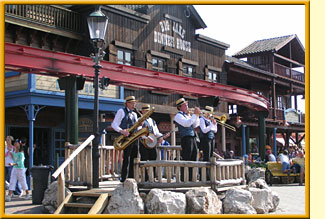 The
year 2005 started sensational. During the first half of the year the band
was seen on national TV for at least 7 times. As a result a phone call came
from Slagharen, where an important holiday resort with fun park is located.
The band was contracted for a unique row of 104 performances on their park.
The
year 2005 started sensational. During the first half of the year the band
was seen on national TV for at least 7 times. As a result a phone call came
from Slagharen, where an important holiday resort with fun park is located.
The band was contracted for a unique row of 104 performances on their park.In January the band played at the prestigious Promenade Jazz Gala with Sytze van Duin as guest soloist.
After all these successes it felt like a necessity to record a new CD.
During March the band went again to the studios of Max Bolleman in Monster. Personal: Michel Muller - tp, Selena Kuiper - tbn. voc, Bert Brandsma - saxes, cl, Henk Haverhoek - bass, Raymond van der Hooft - dr, voc, Koos Greven - banjo, Marco Alders - sousaphone and Bob Philipse - washboard.
"The Caribbean Suite" even found radio airplay in the United States.
Especially the Bass-sax pieces became very popular, which meant that Ray van der Hoofd's version of Dr. Jazz, sung in Dutch language was heard over there.
Performances at the Jazz festivals in Breda, Hoofddorp, Heerhugowaard and Zutphen followed. During the performance in Hoofddorp half of the members of the world famous Chris Barber band were sitting in first row, marvelling about the capacities of the band. A nice encounter with people like Bob Hunt and John Defferary.
Kind of wild adventure was a visit to the Isle of Balrum. The organisation made the journey to get there already special in that it was done by speedboat. The entire band of 6 people was unable to get in one, so a second one had to be arranged. Koos and Michael boarded this one, but alas, in the middle of sea, the engine stopped doing what it was supposed to do. The boat started drifting in the direction of England, so a SOS was sent. Michael and Koos were rescued and sent to Baltrum with a third speedboat, so the band could start with a delay of half an hour, with the to late coming musicians still half seasick.
| HOME |